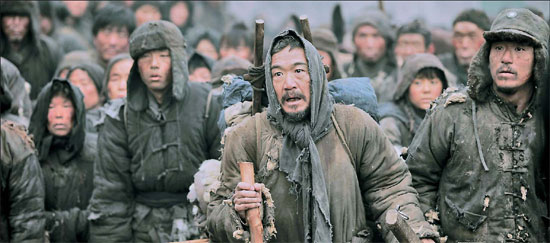The grave side
Updated: 2012-11-23 09:29
By Raymond Zhou (China Daily)
|
|||||||||||
 |
|
Filmmaker Feng Xiaogang's new work, Back to 1942, chronicles the human drama of a devastating famine. It stars A-list actors, including Zhang Guoli. Photos provided to China Daily |
China's most commercially successful filmmaker has placed a high stake on a new work that has none of the trappings of his previous hits. Raymond Zhou reviews.
Feng Xiaogang, who's renowned for his year-end urban comedies, now has on offer a historical saga so tragic that tears run dry before the movie reaches a midpoint, at least for the characters. This comes in a season that was singlehandedly created by him to be mindlessly jovial - one that escapes from the heavy themes in life.
I have always suspected that, buried deep inside the comedic facade of this movie populist, is someone who not only strives for depth but also ponders some of the most puzzling philosophical questions that plague the country, such as why bad things keep happening to China. The superstar director has done a very good job hiding his gravitas - until now.
Long-neglected episode
Back to 1942 is about the famine that affected 30 million people in Henan province in the title year, killing one-tenth of the population. The natural disaster caused by locusts and drought was exacerbated by the imminent invasion of the Japanese army and something more.
The snaking and grinding multitude of emaciated figures is only half the sad story. The bigger tragedy is the unwillingness to help. The neighboring province blocks fleeing refugees at gunpoint. Japanese invaders bomb them as they are mingled with retreating Chinese soldiers. The national army, instead of offering humanitarian assistance, imposes a levy of grains on an already-starving population - in the name of protecting them from invaders.
Screenwriter Liu Zhenyun and director Feng deliver excruciating scenes of human suffering, but most eye-popping is the depiction of behind-the-scenes manipulation by politicians, who place their own interests above the survival of ordinary people.
On the surface, nobody in the bureaucracy is a bad person: The governor of the province is constantly despondent over the fate of his people, and Chiang Kai-shek, the top leader, is aloof yet not exactly uncaring.
The most poignant details tend to be those seemingly unessential to the narrative: A group of province-level officials squabbling over the distribution of food aid and the pompous preparation to welcome visiting American dignitaries in the wartime capital. They provide a hint at the real causes of the catastrophe of biblical scale, which, in China, is often more manmade than true natural disasters.
The ensemble cast uses a lavish lineup of top-rated performers in roles not big but meaty. Zhang Guoli plays a rich landlord, who is reduced to the same dire straits as his farmers - in a rebuke of the oft-used class theory by which he is supposed to exploit those around him.
Related: Mixed Joy Club
Grassroots law enforcement, personified by Fan Wei's character, is laughably enfeebled by the engulfing violence and misery around his court-on-the-move. Adrien Brody and Tim Robbins, both Oscar winners, espouse the hard choices that confront the press and the church.
Subtle touches of black humor seep into the tone, such as the landlord's daughter selling herself into prostitution and finding it hard to serve her first customer because she has filled her stomach with too much food and is unable to bend down - reminiscent of a moment in Zhang Yimou's To Live.
The movie is a fertile ground for political satire: At the end of the film, when the generalissimo asks the governor about the total toll of the famine, he is first given the official account, which is 1,062. Chiang matter-of-factly pushes for the real number, and, after a pause, the governor says: "Around 3 million".
The biggest irony is Chiang's surprise at the Japanese reaction. Chiang believes it a smart move to let the Japanese handle the hot potato of tens of millions of refugees. But the Japanese are cunning enough to bring them onto their side by providing food, a detail so tricky it is hinted at, rather than presented outright.
Feng also uses a visual analogy for the Japanese tactic: A Japanese officer uses a bayonet to feed a Chinese refugee and, when rejected, pushes the steamed bun and the bayonet through his mouth and skull.
For more coverage by Raymond Zhou, click here
Related Stories
Xu Fan, Feng Xiaogang promote 'Back to 1942' 2012-11-11 11:37
Trailer of new film 'Back to 1942' released 2012-08-17 16:45
Mixed Joy Club 2012-11-09 17:30
Blessed are those who are happy 2012-10-22 10:19
Is Mo Yan man enough for the Nobel? 2012-10-09 09:58
Today's Top News
President Xi confident in recovery from quake
H7N9 update: 104 cases, 21 deaths
Telecom workers restore links
Coal mine blast kills 18 in Jilin
Intl scholarship puts China on the map
More bird flu patients discharged
Gold loses sheen, but still a safe bet
US 'turns blind eye to human rights'
Hot Topics
Lunar probe , China growth forecasts, Emission rules get tougher, China seen through 'colored lens', International board,
Editor's Picks

|

|

|

|

|

|





